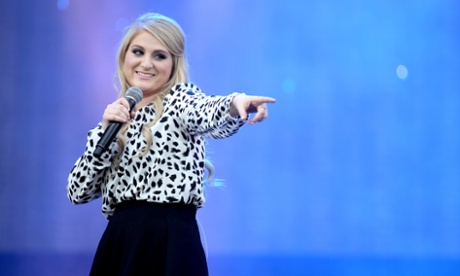
How did a debut single that has yet to even be officially released in the UK, by an unknown popstar, crash into the singles chart on Sunday? You might have heard Meghan Trainor’s addictive pop-ode to full figures, All About That Bass. In a sea of summertime jams dedicated to butts (Nicki Minaj’s Anaconda and Jennifer Lopez’s surprisingly flat Booty to name two), Trainor’s effort stands out: she has taken the top spot in 27 countries with her celebration of feminine curvature, breaking a British record by being the first song to hit the top 40 on streaming alone. The song’s official video has been viewed more than 100m times in just over three months. Naturally, then, given its ever-growing popularity with girls – mostly teenagers – the snarky backlash was inevitable. But why are feminists asking if All About That Bass is bad for women?
On the face of it, it’s easy to see why Trainor has such a mega hit on her hands: with its bubble-gum pink music video, instantly-memorable lyrics, and addictive bassline, it’s hard not to love – that’s before you even get to its celebration of women with “all the right junk in all the right places”. But just as quickly as the song caught on worldwide, criticism arrived that the lyrics “skinny shame” women who happen to have smaller figures – at petty odds to the body-positiveness the song embraces. Others have argued that when Trainor sings that “boys like a little more booty to hold at night”, she’s peddling a muddled brand of self-acceptance. As Chloe Angyal put it on Feministing: “loving yourself because dudes like what you’ve got going on is a pretty flimsy form of self-acceptance. In fact, it’s not really self-acceptance at all, if it depends on other people thinking you’re hot.”
Of course, I’m aware of the drawbacks to the song: yes, there’s mixed messages. Yes, it commodifies Trainor’s size just to sell singles. But, really, this isn’t an academic polemic on modern womanhood: it’s a pop song. A damn fun and catchy novelty one, sung by a “plus-size” 20-year-old from Nantucket who is unlikely (sorry Megan) to be here for the long haul. Adult feminists may balk, as if there wasn’t so much more to level their ire at, but I like to think about the millions of young girls who love it and have made it an anthem – girls who are constantly being bombarded by beauty ideals translating to being a size two with creamy, alabaster skin and enviable waist circumferences.
Just take a look at the male pop stars who have recently released songs lyricising what they consider hot women: videos for Bruno Mars’ The Way You Are, and One Direction’s What Makes You Beautiful both feature a standardised, unachievable ideal of beauty with their female stars. Their songs, and John Legend’s You And I, sell the idea that self-doubt and low self-esteem are what’s attractive and sexy in women: “She doesn’t know she’s beautiful, and that’s what makes her beautiful.” Trainor emphasises the exact opposite.
That and the fact that she “owns” the conversation over her body can only have helped normalize teenage anxieties. Sure, I can see how the song is alienating to girls who might just naturally be a size two, but skinny shaming? Is this really a thing? Can thin women not feel OK that the vast majority of songs are written for them instead? Take a look at nearly any music video, television show, movie or modelling campaign, and chances are it features a classically beautiful woman: lithe, skinny, pretty in all the “regular” ways. If All About That Bass is a body-acceptance anthem for big girls, relax: pretty much everything else in the canon of pop for the last six decades has been a an ode to the skinny girls.

